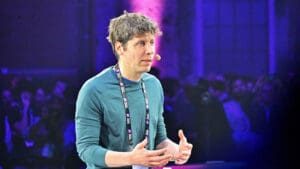Bryan Scott McMillan built his career on vision, discipline, and a deep understanding of people. Born in Las Vegas, Nevada, and raised in a working-class family, he learned responsibility early as the eldest of three brothers.
His upbringing taught him the value of hard work and resilience—qualities that would later define his leadership style.
A former wrestler, Bryan brought the same focus and determination from the mat into business. He earned a Bachelor of Arts in Political Science and Business from Arizona State University, where he graduated with honours, and later completed executive programmes at Harvard University and the University of Texas at Austin.
Over more than 30 years as a leader in business, Bryan became known for transforming ideas into sustainable growth. As a business leader, he guided global teams, revitalised underperforming divisions, and developed innovative strategies that improved operations and profitability. His approach was people-first—believing that great business results come from empowering others to perform at their best.
Bryan’s leadership philosophy is built on accountability and clarity. “You can’t lead from the top,” he often says. “You lead from within.” His ability to unite teams around shared goals made him a trusted leader through times of both change and growth.
Now retired, Bryan Scott McMillan continues to share his experience through mentorship and community work. His career reflects a simple truth: strong leadership isn’t about control—it’s about vision, empathy, and building others up to succeed.
Bryan, your career spans more than three decades in business and leadership. Let’s start at the beginning—what first motivated you to pursue this path?
I’ve always been curious about how things work—people, systems, ideas. My background was in political science and business, and what fascinated me was how leadership could turn vision into action. I didn’t set out with a grand plan. I just wanted to make things better wherever I was.
When I started out, I noticed something that’s still true today: people make or break any organisation. You can have the best strategy, but if the people behind it aren’t aligned, it won’t go anywhere. That understanding shaped my entire career.
You’ve led large teams and major projects. How did you develop your leadership style?
A lot of it came from my childhood in Las Vegas. My parents worked hard—really hard—and as the eldest of three boys, I had to take responsibility early. My mother was tough but loving. I remember one day I came home after being bullied. I was crying, and she locked the door and said, “You can’t come in until you stand up for yourself.” It shocked me, but I did it—and it taught me something. You can’t rely on others to fight your battles.
That mindset carried into leadership. I don’t believe in micromanagement. I believe in empowerment. My job is to give people the tools, trust, and clarity to make confident decisions. Leadership isn’t about control—it’s about guidance.
Business environments can change quickly. How do you approach uncertainty and challenge?
Change doesn’t bother me; complacency does. Early in my career, I saw companies fail not because they lacked resources, but because they stopped listening—to customers, to employees, to new ideas.
Once, I was asked to lead a struggling business division that had been losing momentum for years. Instead of restructuring from the top, I went straight to the team and asked for their views. We mapped out every problem—communication gaps, inefficiencies, morale issues. Then we fixed them together. Within a year and a half, the division was performing better than anyone expected.
That experience reinforced something simple: the people closest to the work often have the answers. My role wasn’t to dictate solutions—it was to connect insight with action.
You’re known for building resilient teams. How do you keep people motivated during tough times?
The secret is honesty. People can handle bad news, but they can’t handle uncertainty. If there’s a problem, be upfront about it—but pair it with a plan.
There was a time when a major project I led faced unexpected delays. Instead of hiding it, I brought everyone together and said, “Here’s what’s gone wrong, and here’s what we’re going to do next.” We tackled it step by step and turned it into a case study for better communication and preparation.
Confidence doesn’t come from pretending things are perfect, it comes from proving that together, you can overcome what isn’t.
You’ve studied at both Harvard and the University of Texas at Austin. How did that education influence your perspective as a leader?
Those programmes taught me how to think globally while acting locally. At Harvard, I learned about structured decision-making and how to balance intuition with logic. At UT Austin, I studied strategic communication and marketing, which helped me understand how to connect ideas to people in a meaningful way.
But the real lesson was about collaboration. Being in a room full of leaders from different backgrounds reminded me that no matter where you work, business always comes down to human connection—motivation, trust, and respect.
After years of leading in business, you now focus much of your time on mentoring and community work. What prompted that change?
Losing my wife to cancer in 2006 changed my life. My children and I went to The WARM Place in Fort Worth, which helps families dealing with grief. It gave us hope when we needed it most.
That experience inspired me to give back. I began volunteering there, and later founded Families with Holes, a non-profit that supports people going through loss. I also volunteer at Camp Sanguinity, which serves children with cancer and blood disorders. Those experiences have grounded me. They’ve reminded me that leadership isn’t only about performance—it’s about compassion.
How do you define success today?
For me, success used to be about achievement—titles, growth, results. But over time, it’s become about impact. Did I make a difference? Did I leave things better than I found them?
I tell people, you can’t lead from a spreadsheet. True leadership is about connection—helping others rise, even when you’re no longer in the spotlight. That’s the kind of success that lasts.
Finally, what advice would you give to young professionals starting out?
Stay curious and stay human. Don’t let fear stop you from trying something new. Some of the best ideas I’ve seen came from people who weren’t afraid to question the norm.
And remember, success doesn’t happen overnight. I wrestled for years before I won a major match. Every setback taught me something I couldn’t learn from victory. The same goes for business, and for life.






